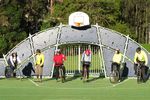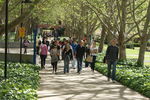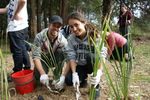Macquarie University
The vision for Macquarie is to be ecologically sound, socially just, and economically viable in all our activities. To achieve this, we have been working diligently and collaboratively across the various core areas of business, embedding the principles of sustainability into the fabric of the University. The first Australasian institution to sign up to the LiFE Index, Macquarie was recently ranked third in a national listing of the ‘greenest universities’. Not bad considering they only started the journey in 2008!
Macquarie Sustainability
The Sustainability team is well staffed with 6 full time and 4 part time positions. Each staff member has an area of focus, such as education, engagement, energy, or transport, with four team members sitting within the Property office, and the remainder of staff in a dedicated sustainability cottage. Having a diversity of skills, expertise and knowledge, the team is able to tap into the various aspects of the University with good support from senior management.
Leadership and Governance
Sustainability has been named one of the key strategic directions for the University, as evidenced through supporting policy, plans and procedures. For example, all new staff joining the University undertake sustainability training as part of their induction process. To further demonstrate the commitment to sustainability, the Vice Chancellor (VC) has incorporated it into his portfolio, while University Council annually sets the VC at least one sustainability key performance indicator. Having the Director of Sustainability as part of the VCs office has allowed the team to work across the University, without having a direct association to any one particular area, such as Facilities.
Partnerships and Engagement
Internal and external partnerships are a key focus for the University, and indeed the Sustainability team. Three initiatives that have had a significant impact on internal engagement are the Sustainability Representative Network (SRN), the Student Sustainability Network and the Department Challenge. Each of these initiatives has been praised by staff campus wide, with the Challenge in particular receiving a lot of attention and recognition. The SRN Annual Report provides an overview of how our reps are engaging with the sustainability agenda.
Recently we launched our online interactive Green Campus Guide, as a new way to communicate with our community and better engage them with things we are doing, and tips they themselves can undertake to be more sustainable. Macquarie has also been producing an Annual Sustainability Report for the past four years, as a way to convey our progress and communicate our narrative.
Learning, Teaching and Research
After a substantial review process, the curriculum and graduate capabilities of the University were re-oriented in 2009 around the concepts of People, Planet and Participation. In short, every student who commenced a degree from 2010 was required to undertake one People and one Planet focussed unit, with Participation units coming online in 2013. This was the commencement of a long process to better integrate sustainability into the curriculum.
As of 2012, the next phases of this process commenced, with sustainability in learning and teaching framework being developed, as well as sustainability criteria for the Academic Standards and Quality Committee to assess new and reviewed units. This integration of sustainability across our programs complements our core research areas associated with climate change and social inclusion. Recently, the University ranked fourth for research quality in the Excellence in Research Australia ratings, with environmental science research ranking first.
Facilities and Operations
Significant changes have occurred in the way the University operates. With an average diversion from landfill rate of 78-80%, an extensive furniture reuse system, and a comprehensive paper, fluoro, e-waste, battery, and printer cartridge recycling scheme, our advancement in waste practices in just 3 years has been substantial.
Efficiencies have been achieved in water use, primarily through a combination of technological improvements (such as water savings devices on taps, toilets and showers, and installation of rainwater tanks) and behaviour change programs. The sewer mining and stormwater harvesting system for the sports fields is in the final stages of testing, estimated to save a further 21 million litres of water annually. Energy supply has been diversified to include a number of sources such as tri-generation, thermal energy storage tanks, geothermal and solar panels, and a comprehensive feasibility study is about to be completed to advise the best mix and approach for energy security into the future.
With a significant amount of building being undertaken over the next 30 years, ESD is being firmly embedded into planning processes with a tool being developed to better assess our pre-planning, and post occupancy stages. The tool incorporates environmental and social values to ensure we offer the best building solutions for our community.
The Future
Procurement is a big focus for the University, with a large project commencing this year to address our practices. We will continue to improve the way we address sustainability at a holistic level to truly have the positive impact we believe we can have as an educational institution.
Main Contact Name: Leanne Denby, Director of Sustainability
Main Contact Email: leanne.denby@mq.edu.au
Further information/website: www.mq.edu.au/sustainability
Share with us: www.twitter.com/MQsustain
www.facebook.com/macquariesustainability













